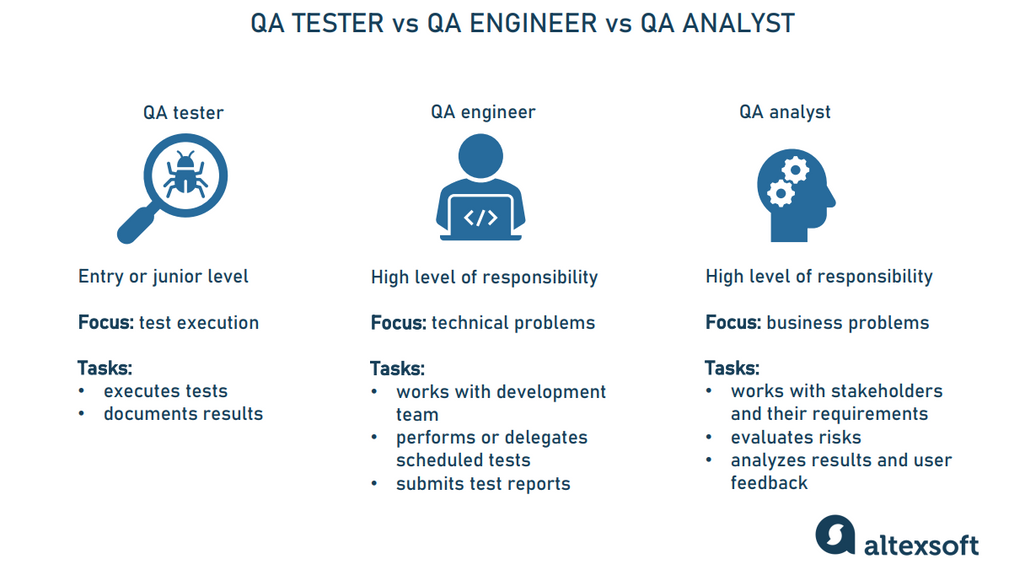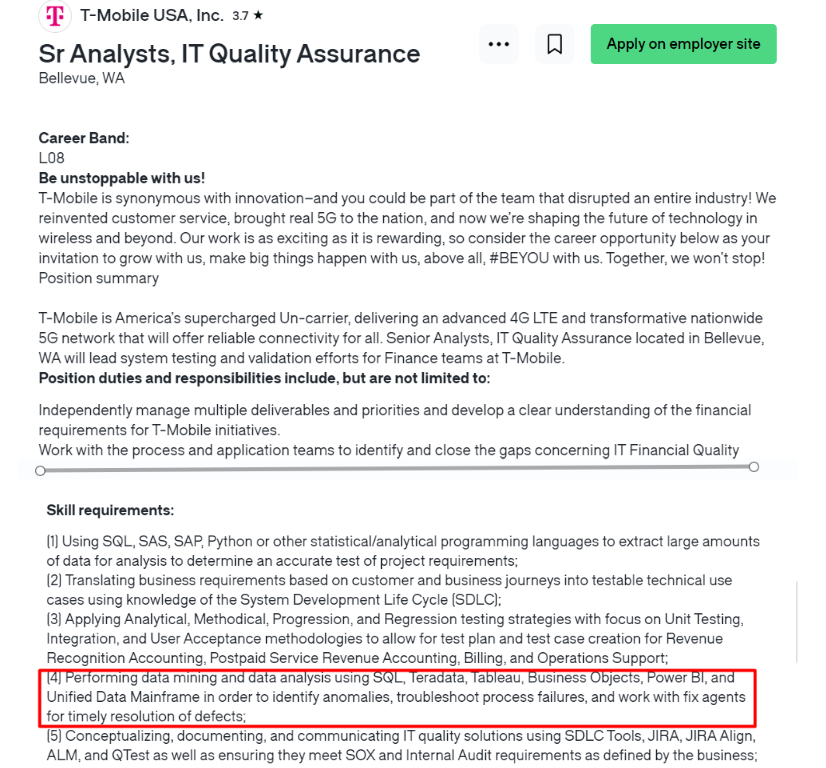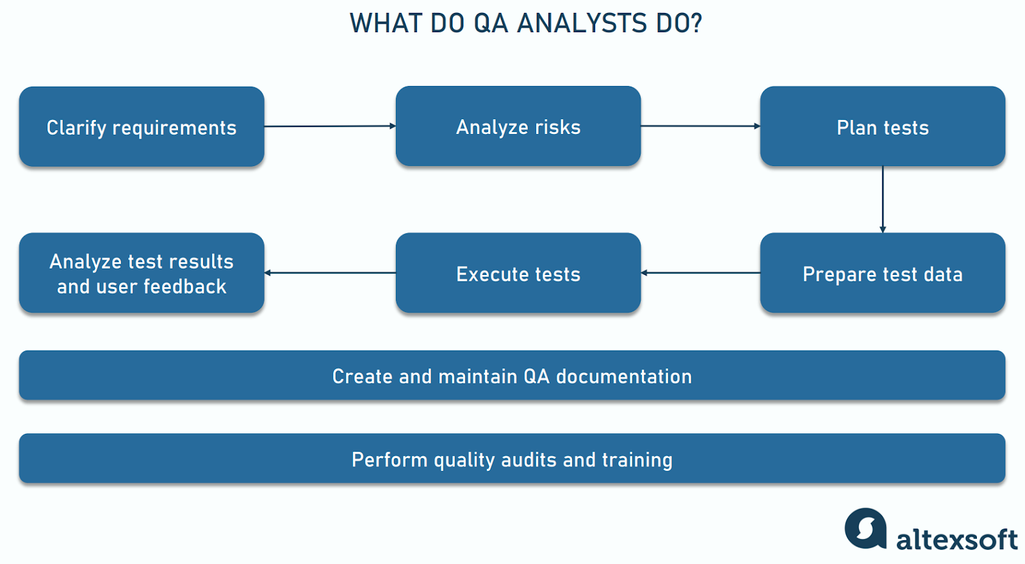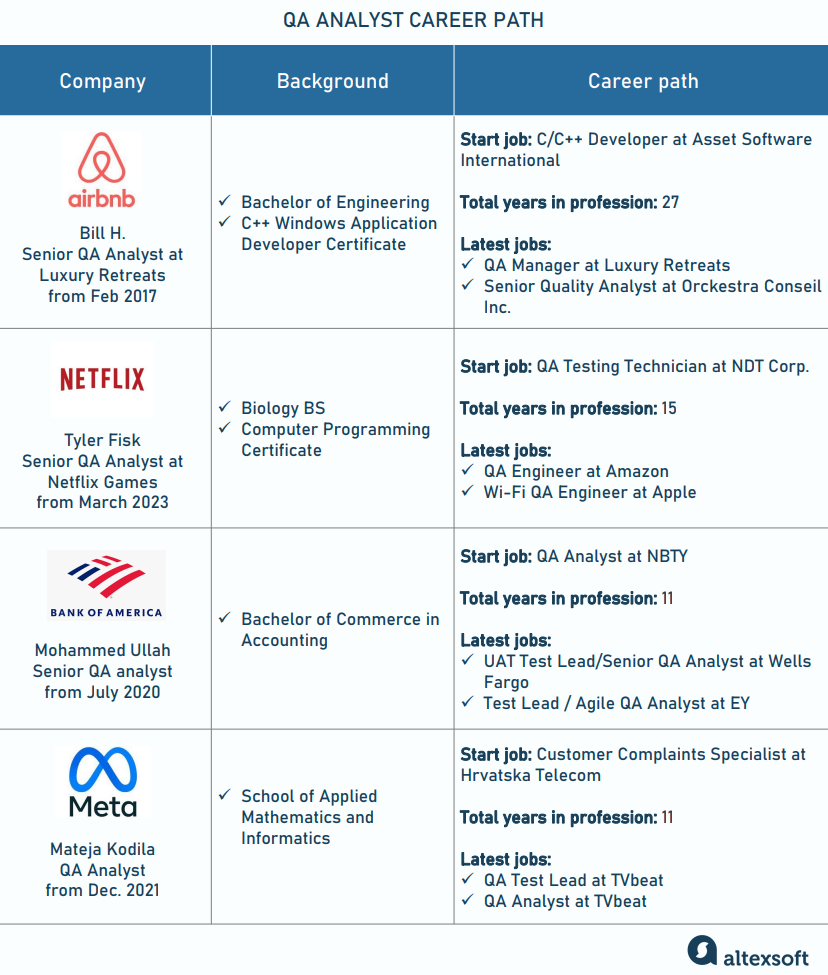The estimated cost of poor software quality in the US is $2.41 trillion, almost 10 percent of the US GDP in the respective 2022 year. This staggering amount encompasses all losses suffered by the US economy due to poor software quality, including cybersecurity breaches and failed development projects. Fixing software bugs alone costs $600 billion annually.
The latter amount could be saved for something useful — like covering two-thirds of total annual spending on Medicare, If the tech industry prioritized Quality Assurance without cutting corners. However, many tech firm owners argue that developers themselves are best suited to test their products. Indeed, a karaoke performer may believe they sound like George Michael, although the audience is squirming with laughter.
In this article, we’ll explore the crucial role QA specialists play in the software development lifecycle, focusing on the role of QA analysts: how they differ from QA engineers and testers, what value they bring, along with the job description, salary info, and more.
What is QA analyst
A QA analyst is a quality expert who ensures that a product that will be released to the public meets its original requirements, aligns with business goals, satisfies end-user expectations, and complies with regulations.
This position exists in many industries, from pharmaceuticals to weapon manufacturing. However, in the IT industry, a QA analyst, also called a Test Analyst, refers to a software testing specialist involved in all development phases, from requirements documentation to the final release, maintenance, and further product improvements.
Like many other roles in the tech industry, the role of QA analyst is not clearly defined. Different companies may mean various things by the term. For example, on job search sites, you can find vacancies for QA analysts, test analysts, QA testers, and QA engineers with almost identical job descriptions and responsibilities. But still, if you look closely, there are differences.
QA specialists compared: QA analyst vs QA engineer vs QA tester
When a QA specialist is asked in a technical interview what software testing is, he or she usually answers something like the following: It is an investigation that is carried out to provide stakeholders with information about the quality of the product being tested. Software quality is a characteristic that shows how well the app meets requirements. It all sounds very formal and bureaucratic.

Key differences between the roles in a QA team
Let’s think of testing like a child's prank: break mom's toaster in a hundred ways. The tester's job is to find all the possible issues before the end user does. First, they ensure the device works as it should and the toast comes out crispy. Then, they check what happens if you put in something unusual, like a brownie, a slipper, or a fork (don’t try this at home; these tricks are performed by professionals!).
Now, back to our QA roles. A QA tester, or simply a tester, is most often referred to as an entry- or junior-level specialist who executes testing procedures according to an approved plan, test scenarios, and test cases. At the end he/she creates bug reports. Sometimes, an inexperienced tester gets carried away, and the kitchen device eventually goes up to smoke.
A few years ago, a story by a junior developer made the rounds on Reddit — he accidentally deleted the production database on his first day at his first job. Junior testers tend to be less forthcoming and far less likely to share their mishaps to the general public, but there are countless memes and jokes about them breaking something in production.
The QA engineer position involves a higher level of responsibility and technical background. They participate in the software development life cycle (SDLC) from the very beginning, the business requirements stage, and prepare a general test plan to cover all requirements with tests: How many seconds should bread be toasted? What melody should be played to signal that the toast is ready? He or she also helps developers understand how all features should work since the QA engineer deals with requirements specifications more than any development team member.


QA engineers perform or delegate scheduled tests, including automated tests. They work closely with the programming team to eliminate defects, submit final test reports, and help management determine whether the product is ready for release.
These responsibilities heavily overlap with those of a QA analyst, and it's common for a senior QA engineer to handle test analysis in a company. However, QA analysts focus more on understanding business problems than technical tasks. They use business data to study user behavior and patterns: How likely is it that a user will put brownies in the toaster? Does a user leave the kitchen while the toaster is on, and can they hear the ready signal from the bedroom? By pinpointing the most and least used or misused features, a QA analyst can identify high-risk areas and potential bugs.
When you need a QA analyst in the QA team
An IT company will benefit from hiring QA analysts in addition to QA engineers when a deeper understanding of business processes and user behavior is needed.
In the travel tech industry, a QA analyst can analyze booking trends and user feedback to optimize the testing process. For instance, they might identify that users frequently abandon bookings at the payment stage. By focusing QA engineers on testing the payment gateway and user interface, they can help improve conversion rates and enhance the overall user experience.
In an eCommerce platform, a QA analyst can study customer purchasing patterns, site navigation data, and feature usage to identify potential areas of improvement or risk that directly impact business goals.
Let's take a look at a specific job ad posted on Glassdoor by T-Mobile USA. The company's finance department requires a QA analyst to lead finance team's system testing and validation efforts. Among other things, his or her tasks will include data mining and data analysis to identify anomalies. The announcement doesn't elaborate, but it can be assumed that a QA analyst might explore data on mobile payment transactions to identify, for instance, unexpected spikes in failed transactions, which could indicate a system bug or a fraud attempt. The analyst can pinpoint the issue, understand its cause, and then work with developers to correct the underlying defect, ensuring the system runs smoothly.

QA analyst responsibilities and skills vary from company to company. Source: Glassdoor
In all the cases mentioned, the test analyst bridges the gap between technical testing and strategic business needs, ensuring that the product not only functions correctly but also aligns with business objectives and delivers a superior user experience.
QA analyst responsibilities
The day-to-day work of a quality assurance analyst will vary depending on the product or project, the stage of development, and the organization's structure. We've compiled a list of key responsibilities based on the International Software Testing Qualifications Board (ISTQB) standards and dozens of job postings on Indeed, LinkedIn, Glassdoor, and ZipRecruiter.

Key responsibilities of a QA analyst
Clarification of product requirements. A QA analyst is involved in the testing process from the first step of the SDLC, which is gathering business requirements from the client or stakeholders. The QA analyst provides feedback on requirements' completeness and testability.
Risk analysis. It includes brainstorming with stakeholders and carefully analyzing the project's scope and complexity. Early identification of risks allows a QA team to prioritize testing and allocate resources efficiently. A risk mitigation strategy entails assessing each risk's potential impact and prioritizing the testing activities. Certain risks may require more rigorous testing while improving processes can address others.
Test planning. A QA analyst, like a QA Engineer, can be responsible for creating a test plan and specifying the scope of testing and test criteria (metrics that define the test's successful outcome). He/she selects and applies appropriate testing techniques to ensure that tests provide an adequate level of confidence based on defined coverage criteria.
Preparing test data. If a QA analyst is also involved in preparing test data (for example, user credentials, credit card numbers, or any other data needed for test execution), he or she may need test data management tools like DATPROF or Informatica Test Data Manager.
Test execution. In some companies, a QA analyst performs all the necessary tests, such as functional, performance, regression, manual, or automated, along with other QA team members. Still, in general, his or her task is to focus on exploratory, usability, and user-accepting testing to simulate real-world program-user interactions.
Analyzing test results and user feedback. Test analysts investigate the test results and recommend improvements in the testing process.
They also study user behavior and feedback to prioritize test cases and identify overlooked issues. This can be done by cooperating with a technical support team or through A/B tests, in which two random groups of users are shown different versions of a website or application to see what works better. Other options include surveys, Google Analytics, and heat mapping tools that visualize user interactions on your website by coloring areas where people click, scroll, or move a mouse.
Creating and maintaining quality documentation. It usually consists of test plans, test cases, checklists, bug reports, and test status reports. Up-to-date documentation is crucial for one of the main QA analysts' goals: keeping key stakeholders informed of project status, issues, risks, and deliverables.
Performing quality audits and training. A test analyst regularly reviews test procedures, methodologies, and documentation to verify compliance with company testing strategy, guidelines and industry best practices. He or she also provides quality process training to other team members and acts as an internal quality consultant.
QA analyst skills and toolset
Like responsibilities, specific skill requirements can vary depending on the company, project, and QA team composition. However, they generally fall into several categories.
Testing methodologies and design techniques
QA analysts must organize the testing process in such a way that it guarantees the high quality of the product. The first principle of testing states that exhaustive testing is impossible. However, one should strive for perfection. Professional intuition, the ability to see the big picture, domain knowledge, and a deep understanding of testing processes, particularly test design techniques, help in this endeavor. Test design techniques are systematic approaches to creating test scenarios to cover as many requirements as possible using as few tests as possible.
Writing skills
Another characteristic of a good test analyst is the ability to write clear and concise test documentation: test plans, checklists, and test cases. Testers use tools like JIRA, Azure DevOps, TestRail, and Trello to manage test tasks, track bugs, and store documentation.
Engineering skills
With test automation becoming increasingly important in software quality assurance, testing specialists need at least a basic knowledge of one or more programming languages. The most common tools used for automation are Python, Java, and JavaScript.
Popular test automation tools include Selenium (a widely used open-source instrument for web application testing that supports multiple languages), Cypress (an advanced front-end testing framework for JavaScript), and Postman and SoapUI for API testing.
Data analysis and research
Statistical and analytical programming languages like Python (again), R and SAS are also valuable. They can be used to:
- analyze test results to identify trends, anomalies, and areas for improvement;
- investigate root causes of defects and understand their impact using statistical methods; and
- generate detailed reports and visualizations that provide insights into test coverage, defect density, and other key quality metrics.
To effectively manage and query databases, a QA analyst must be familiar with common database management systems such as MySQL, MongoDB, Oracle Database, and Microsoft SQL Server. To work with these instruments, proficiency in SQL (Structured Query Language) is essential.
Soft skills
Even though you see this line in most job ads, there is no getting away from it: A QA analyst really needs strong analytical skills and great attention to detail. The work can be pretty monotonous, so you need to stay focused. On the flip side, creativity is key when deciding on testing methods and approaches.
Problem-solving capabilities and comfort in making decisions independently are also important. An essential part of a QA analyst's work is constantly hunting for bugs and problem areas, so finding them should spark excitement, curiosity, and a drive to solve them quickly.
Good communication skills are vital for working effectively with the team, especially when collaborating with developers to fix bugs. A common IT meme captures a typical developer's reaction to a bug report: "It's not a bug; it's a feature."
Finally, it does not hurt to have a background in public speaking, as QA analysts often need to present and discuss business and quality processes with others.
How to become QA analyst
The path to the QA analyst position is quite unpredictable, and may start as a junior tech support specialist or C++ developer. If your attention is often drawn to the flaws and defects of a product and you want to get to the bottom of it, then most likely, you can become a QA analyst. Here's a general career recommendation that might be useful for you.
Education and background
Few universities offer software quality assurance courses, so most QA analysts have a bachelor's degree in computer science, Engineering, or a related field. However, many IT companies no longer require formal education from candidates, believing that equivalent practical experience is enough.
To gain basic knowledge of QA, you can take an online course or a bootcamp. The latter is an intensive, fully immersive course that involves studying full-time and lasts from a few weeks to a few months. Bootcamps are usually organized by testing schools.
However, working on a real project is more effective than any bootcamp. A bachelor's degree in computer science can land you a job as a QA tester or technical support specialist, which is a good starting point. As you gain experience, you'll develop an intuitive sense of problem areas in a program or application. During regression testing before the next version release, you might find yourself saying, "Damn, I knew this module would fail after all those changes!" When that happens, it might be time to move up to an analyst role if a position opens up.

Examples of QA analyst careers
QA analyst certification
The following certificates and courses help fill QA analyst knowledge gaps. They are most widely recognized and respected and offer better career benefits.
ISTQB Certified Tester Foundation Level (CTFL) is the standard requirement in tons of job postings for any QA position. It provides fundamental knowledge of software testing principles, processes, and methodologies. It covers key concepts like test design, test management, test techniques, and the software development lifecycle. ISTQB (ASTQB in the US) is a non-profit organization and doesn’t sell courses. It allows students to self-study or choose any school and provides free exam preparation materials.
ISTQB Certified Tester Advanced Level Test Analyst (CTAL-TA) is a higher-level certification. It specializes in advanced testing techniques and methodologies and the practical application of testing in projects. It is beneficial for senior test analyst roles. Candidates must hold a valid CTFL certificate and at least 1.5 years of relevant work experience in the software testing industry.
QAI Global Institute Certified Software Quality Analyst (CSQA) is another prestigious certification, though not as widely regarded. It is aimed at an entry-level QA analyst. The program focuses broadly on quality assurance, quality control tools, standards, models, and frameworks. QAI is a private, for-profit company that sells training courses.
QA analyst salary – what to expect?
According to Glassdoor, the average salary for a QA analyst with 2-4 years of experience ranges from $75,000 to $116,000 per year. Senior QA analysts earn between $105,000 and $160,000 annually. These figures vary based on factors like domain knowledge, familiarity with necessary tools, location, and company size.
QA analysts often enjoy additional perks, such as health insurance, cash bonuses, and tuition reimbursement. All the effort to qualify is worth it: The US Bureau of Labor Statistics predicts a 20% growth in demand for QA analysts through 2032. People who consider this profession (and company owners too!) should take note of these statistics.

Olga is a tech journalist at AltexSoft, specializing in travel technologies. With over 25 years of experience in journalism, she began her career writing travel articles for glossy magazines before advancing to editor-in-chief of a specialized media outlet focused on science and travel. Her diverse background also includes roles as a QA specialist and tech writer.
Want to write an article for our blog? Read our requirements and guidelines to become a contributor.

